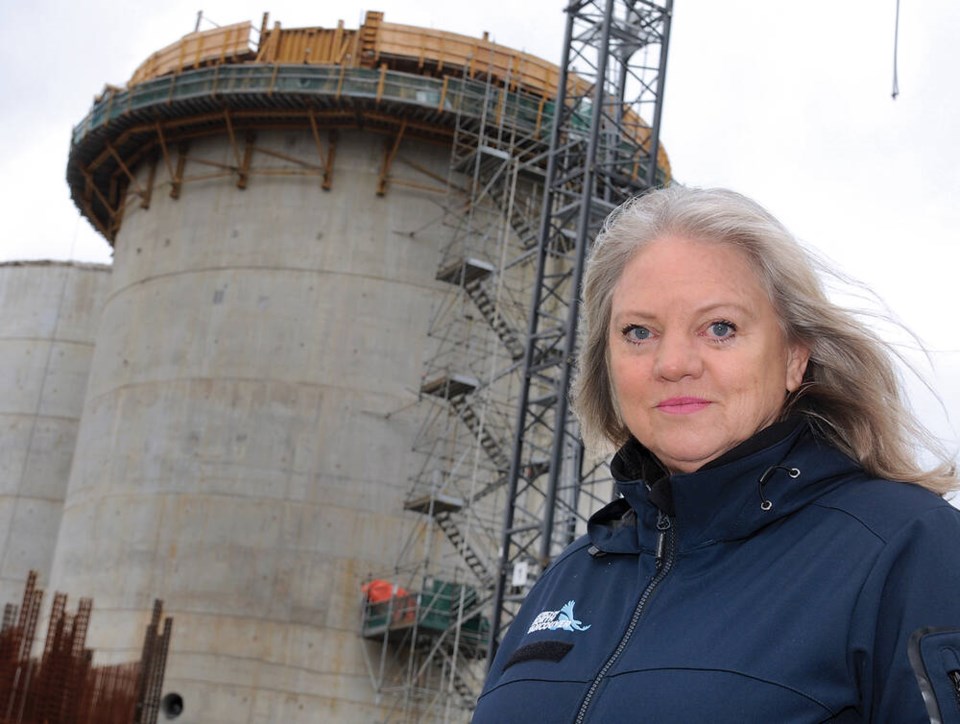The District of North Vancouver is calling for the province to conduct a full public inquiry into Metro Vancouver’s handling of a wastewater treatment plant project that is facing a decade-long completion delay and is overbudget by billions of taxpayer dollars.
At a meeting on Monday, DNV council voted to request that the B.C. government hold a public inquiry into the North Shore Wastewater Treatment Plant.
When Metro originally budgeted the large infrastructure project in 2017, the estimated cost was $700 million with an expected completion date of 2020. That cost has since ballooned more than 450 per cent to nearly $4 billion, and an end date is not yet in sight.
This staggering increase in cost and time demands a robust investigation, with transparency and accountability from Metro, according to a report authored by Coun. Catherine Pope.
In her report, she noted that North Shore residents will shoulder a disproportionate share of the cost, paying $590 annually for 30 years, compared to $80 to $150 for 15 years in other Lower Mainland municipalities.
Although an independent performance audit has been announced, Pope argued that its independence is questionable as it's overseen by Metro, which limits the review’s scope and effectiveness.
A fully independent public inquiry would provide a comprehensive investigation into the WWTP project, and work to restore public trust in the regional body, Pope wrote.
Metro processes should be reviewed to prevent future cost overruns, council says
In March, Metro put out a press release. Buried in it was the mention that the WWTP would now cost $3.8 billion, the councillor stated at Monday’s meeting.
“That was the first time I became aware of the staggering cost of the project, and most of us on council were shocked,” she said. “We still don’t know what went wrong and why taxpayers are now on the hook for massive cost overruns.... The public deserves answers.”
Currently, it’s not public knowledge whether the mess is the result of fiscal mismanagement, if there’s something wrong with Metro’s governance model, or if the ball was dropped after Acciona was fired with no follow-up plan and no work done on the site for three years, she said.
“So we need to ensure that the governance and management practices at Metro are thoroughly examined to prevent future fiscal mismanagement on large-scale public infrastructure projects such as the plan for the $10-billion Iona Wastewater Treatment Plant,” Pope said.
Pope said she recently spoke with Wally Oppal, who previously commissioned several public inquiries in B.C., and he noted how more evidence can come out in inquiries than trials, she said.
“The Metro board’s processes and decisions have been shrouded in secrecy. The justification pertains to lawsuits with the contractor, but this culture of secrecy continues today in how Metro conducts itself … and that needs to change,” Pope said.
Coun. Lisa Muri, who sits on the Metro board, said she and others on the board asked that the province conduct a review of the project.
“[Premier David Eby] declined and said that he felt that it was Metro’s responsibility to look into this project on their own, and if he was not satisfied, or the province wasn’t satisfied, they would move forward and undertake a subsequent review,” she said.
But now that the provincial election is over, maybe there will be a second thought.
“So maybe, I think, this is good timing,” Muri said.
Any inquiry should focus on things unique to the project, not widespread cost escalations, said Mayor Mike Little.
“I’m really wanting them to dig down into what’s unique about the North Shore Wastewater Treatment Plant, the procurement process, the first contractor … how Metro Vancouver came to the decision to end our ways with that contractor, and then obviously where we are into the litigation piece,” he said.
“I think that bucket is the stuff that is going to tell us the most important aspect of this, of where we are at today,” Little said.
Editor's note: Metro Vancouver has since reached out to the North Shore News to clarify its stance on the treatment plant project.
Spokesperson Jillian Glover said Metro has consistently shared information with the Metro board, media and the public about the project and the reasons for the cost increase resulting from the termination of the contract with Acciona Wastewater Solutions.
"This information has been shared through various means, including: a two-hour press conference held following the board decision on the project cost increase this past March 22, 2024; a monthly newsletter about the project; and a website with comprehensive project information, including full copies of the public court filings.
"Some information related to the new plant has been shared in closed meetings due to ongoing litigation that could result in the recovery of hundreds of millions of public dollars in damages from the previous contractor. However, substantial information related to the reasons for the cost increase has been in the public domain since it was disclosed in March."




